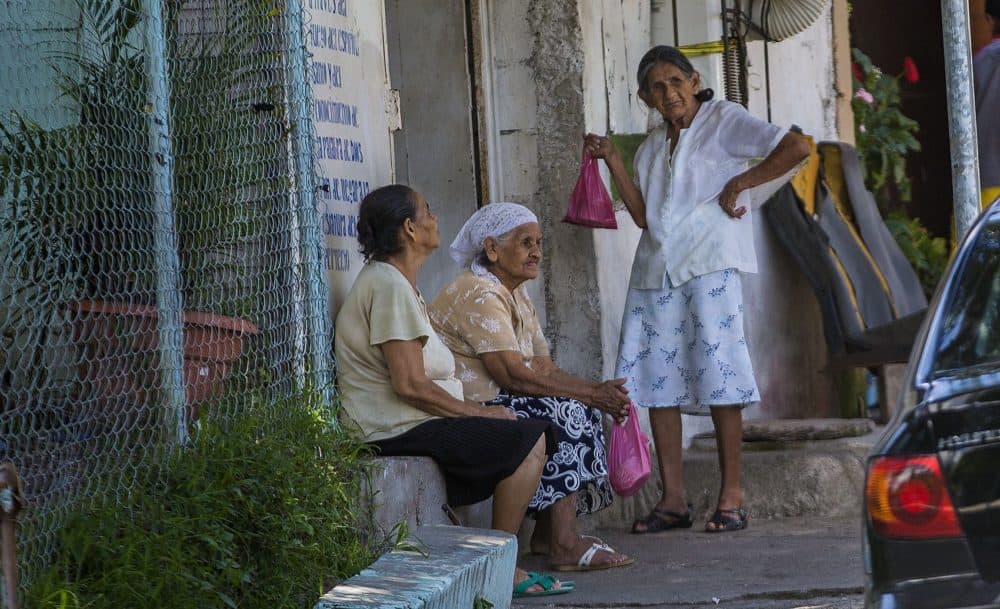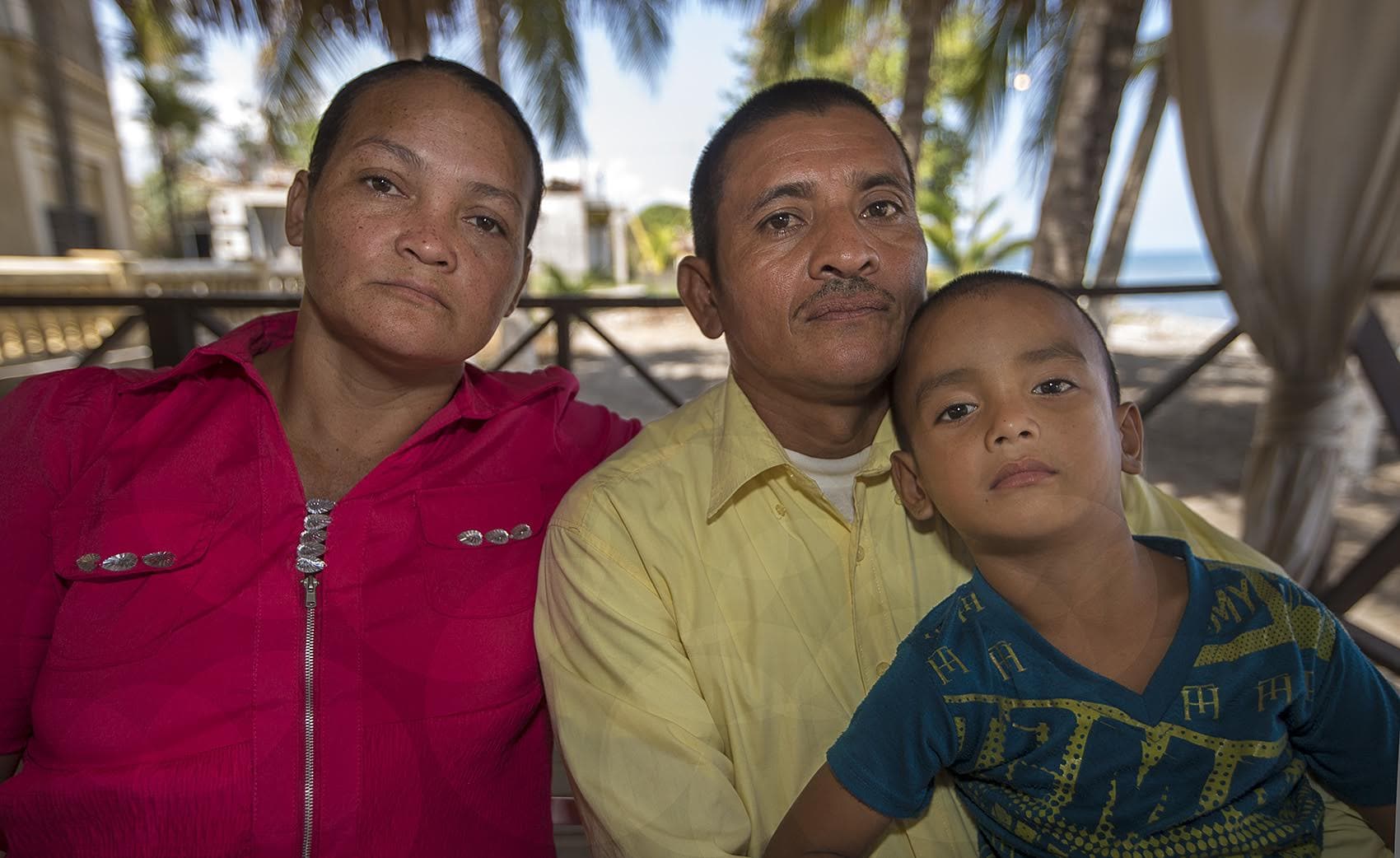Advertisement
Reporter's Notebook
Deported Back To Their Country, Salvadorans Are Greeted With Two Pupusas And A Juice

WBUR’s Shannon Dooling and photographer Jesse Costa are reporting from Honduras and El Salvador as a delegation of Massachusetts politicians and immigration advocates visit the two countries this week. Shannon’s dispatches are here, with the latest on top. The trip began in Honduras. On Wednesday, the pair began reporting from El Salvador. Here are more of Jesse’s photos.
Thursday, Aug. 16
The delegation took a van from the hotel in San Salvador this morning, leaving behind a tourist-friendly neigborhood, and headed for the Centro de Atención Integral Para Migrantes — the Center of Integral Care for Migrants, in English.
This is where Salvadoran nationals deported from the U.S. and Mexico are processed back into El Salvador. It's the only government-run facility of its kind in the country and it provides services for unaccompanied minors, families and individuals.
We were told by government officials here that the center receives, on average, three flights from the U.S. every week with up to 135 people on board. These are federally administered flights, booked by the U.S. Department of Homeland Security. The passengers are not traveling on your average commercial airliner but instead are shackled at the hands, waist and feet.
A new arrival is welcomed at the center and offered a meal of two pupusas, a Salvadoran staple comparable to a miniature quesadilla that's served in a Styrofoam container, and juice in a plastic cup. After undergoing several rounds of interviews with Salvadoran immigration officials and police, they receive a government I.D. They can pick up new clothes and take a shower, make phone calls and access medical care.
We were told the entire process usually takes around two hours, at which point an individual is free to go. Depending on their final destination within El Salvador, the new arrival is given between $1 and $6 for transportation.
Tomorrow, we're heading back to the center to talk with some of the Salvadorans who arrive on a flight from the U.S. For some of these people, they're returning to a country they haven't called home in years.
Tuesday, Aug. 14
We were warned about the flight into the Honduran capital city of Tegucigalpa. No one mentioned, however, that the airport has actually been called one of the most dangerous airports in the world. Instead, we were told that landing at Toncontín International Airport is — in a word — "thrilling."
So when it suddenly felt like we were diving into a tailspin, I wasn't entirely shocked. With a series of drastic turns and dips in elevation our pilot masterfully navigated around the mountains and hillsides, landing our propeller-powered airplane as smoothly as one can expect when aiming for a short runway on a shallow plateau. My fellow passengers applauded, I sincerely thanked the pilot, and we disembarked for another busy day with the delegation.
A group of Honduran human rights activists, university students and community organizers were waiting at the hotel, eager to share their personal experiences living in a country plagued by widespread poverty and violence.
"If people want to leave and migrate from Honduras, they should do so because they want to — they shouldn't be forced out because of violence and poverty," said Wilfredo Méndez, executive director of the Center for Investigation and Promotion of Human Rights.
Students from The National Autonomous University of Honduras spoke of being arrested for organizing political rallies. Marcio Silva, who's facing a prison sentence as a result of his student activism, said he doesn't dream of moving to the U.S. so that he can clean toilets for Americans. He'd much rather stay in his own country, he said, and help build a better future for young people. As of now, though, he has little hope of that happening.
Rampant domestic violence experienced by women and young girls was also part of the discussion. The popular hashtag #NoQuieroSerViolado — “I don’t want to be raped,” in English — is a result of the high levels of violence women experience in Honduras, said Gilda Rivera, the head of the Center for Women's Rights here in Tegucigalpa. Rivera estimated that every 16 hours, a woman under the age of 30 is killed in Honduras. Most of the murders, she said, go unsolved.
Congressman Jim McGovern and Somerville Mayor Joseph Curtatone were listening intently and taking notes as, one by one, the people gathered around the table shared their stories. These individual stories are reflective of some of the factors driving Central Americans to migrate to the U.S.
First thing Wednesday morning, the delegation heads back to one of the most dangerous airports in the world, in one of the most violent countries in the world, and boards a plane for El Salvador.
Monday, Aug. 13
We woke up before sunrise on Monday and headed three hours northeast from El Progreso to the beach city of La Ceiba. We hadn't yet seen the daylight hit the jagged mountain tops and fill the wide open valleys. We hadn't yet laid eyes on the rich volcanic soil, or the rows of pineapples sprouting up from down below.
Then the clouds turned pink with the first light of the day, and we saw more people riding their bikes alongside the road, dodging potholes and balancing children on the back. We saw groups of men dotting the sides of the road, waiting for the offer of a hard day's work to drive by in a pick-up truck. We saw a small business owner selling coffee and breakfast pastries out of a pushcart, shooing away the occasional stray dog or chicken.
We saw the beauty and the poverty that live side-by-side here in Honduras.
Making our way down crumbling roads crammed with street vendors, we eventually found ourselves at a beautiful beach in La Ceiba, looking out on the Caribbean Sea. This is where we met the Galvez family.

Jose Hector Galvez, his wife, Rosa Lina Lindner, and their youngest son, Hector, were seated by the ocean eating breakfast and wearing their Sunday's best. They told me they live so far away from the ocean they hardly ever see it. They traveled four hours by bus to meet with us and tell us about their daughter, Kenia.
They've not seen her for three months, ever since she was placed in detention by U.S. Immigration and Customs Enforcement. It's a story that has brought them tears and confusion and anguish. It's a story of a family separated at the U.S.-Mexico border, and a stranger in Boston trying to help them reunite. We'll have more on that story later in the week.
While we were in La Ceiba, U.S. Congressman Jim McGovern and Somerville Mayor Joe Curtatone met with other families back in El Progreso. They were hearing stories of torture, disappearance and desperation. It's all part of the fact-finding mission for this delegation. They're hoping to pull together pieces from each of these families' stories and bring them back to Massachusetts and Washington.
We'll head to the Honduran capital city of Tegucigalpa Tuesday, where we'll meet more families and hear their stories.
This article was originally published on August 14, 2018.
